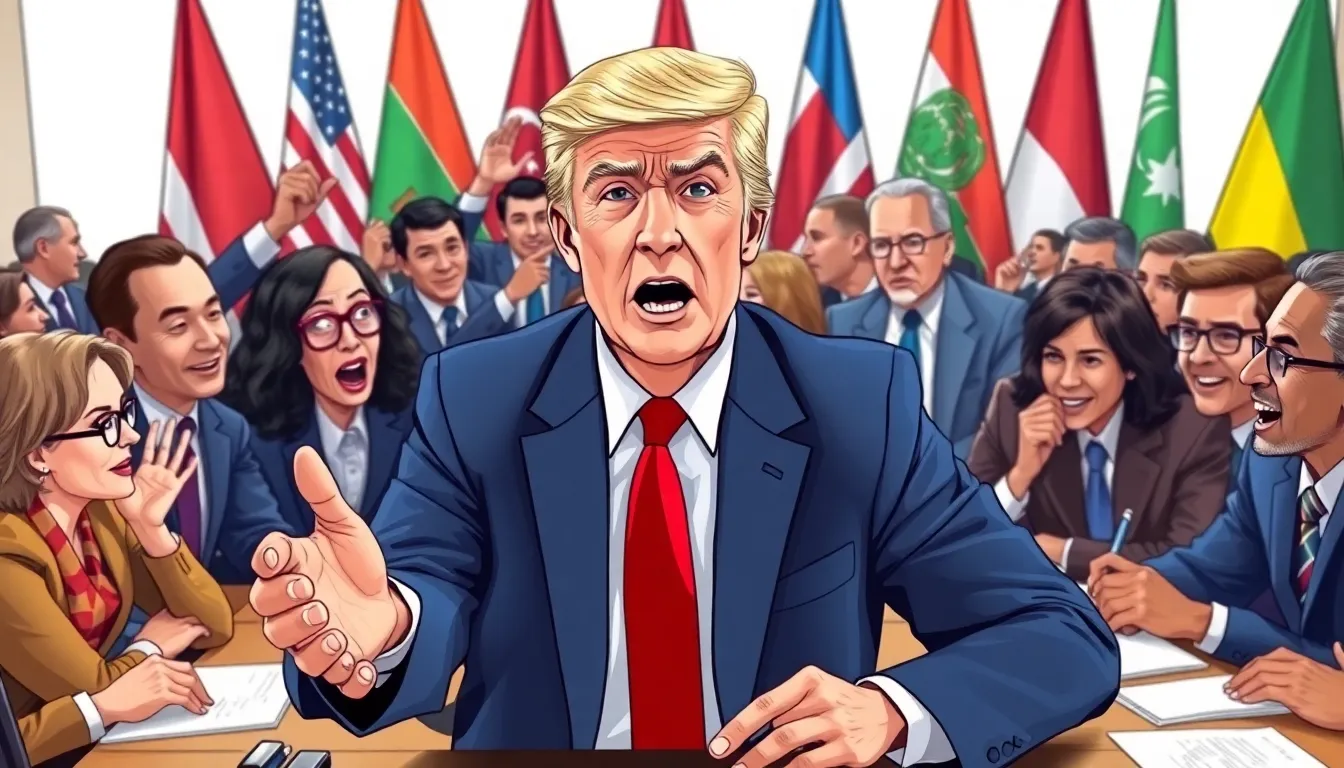In a world where borders blur and cultures collide, a Master’s in Global Affairs is like a passport to endless opportunities. Imagine diving into the complexities of international relations while sipping coffee in a cozy café—sounds like a dream, right? This degree isn’t just about textbooks and lectures; it’s about equipping oneself with the skills to tackle global challenges, from climate change to economic disparity, all while impressing friends with your newfound knowledge of geopolitical trivia.
But let’s be real—who wouldn’t want to impress their next date with a witty remark about international trade agreements? With a Master’s in Global Affairs, students gain not just expertise but also the ability to navigate the intricate dance of diplomacy. So, if you’re ready to change the world and maybe even become the next global superhero, this might just be your calling.
Table of Contents
ToggleOverview Of Masters In Global Affairs
A Master’s in Global Affairs focuses on developing skills for addressing complex global challenges. This advanced degree integrates political science, international relations, and economics, aiming to prepare graduates for impactful roles.
Definition And Purpose
A Master’s in Global Affairs provides comprehensive knowledge about global issues and leadership strategies. Programs often combine theoretical frameworks with practical experiences. Students analyze international policies and learn to navigate diplomatic landscapes. Core subjects typically include global security, international law, and sustainable development. Graduates emerge as informed professionals ready to influence global change.
Importance In Today’s World
Global interconnectedness necessitates understanding diverse cultures and geopolitical dynamics. This master’s degree cultivates awareness of pressing issues such as climate change, poverty, and social justice. Many employers seek individuals with expertise in international collaboration and conflict resolution. The program enhances analytical skills, critical for formulating solutions to complex problems. As the world faces increasing interdependence, those equipped with a Master’s in Global Affairs remain vital in shaping a more equitable future.
Program Structure
A Master’s in Global Affairs includes a comprehensive mix of required and elective courses. This structure fosters a deep understanding of global challenges.
Core Curriculum
Core courses focus on essential areas such as global security, international law, and sustainable development. Students explore frameworks that analyze political phenomena and economic strategies. Classes encourage critical thinking and collaborative problem-solving. Engaging in real-world case studies allows students to connect theory with practice. Exposure to diverse viewpoints enriches discussions and expands perspectives on pressing global issues. Experiential learning components, like internships or fieldwork, enhance practical skills necessary for future leadership roles.
Elective Courses
Elective courses offer a range of topics tailored to individual interests and career aspirations. Topics might include human rights advocacy, environmental policy, or global health issues. Flexibility in course selection empowers students to specialize in areas that resonate with their goals. Participating in seminars on emerging global trends further deepens knowledge. Networking opportunities arise through interactions with industry experts and guest speakers. Students can shape their educational journey while preparing for impactful careers in international relations.
Admission Requirements
Admission requirements for a Master’s in Global Affairs vary by program, yet several common elements exist.
Academic Qualifications
Most programs require a bachelor’s degree from an accredited institution. Relevant fields of study often include political science, international relations, economics, or a related discipline. Some universities accept degrees from diverse backgrounds, as they value a holistic approach. Additionally, many programs consider both GPA and coursework rigor. Strong academic performance signals a candidate’s ability to thrive in a challenging environment. Applicants may also need to provide transcripts showcasing their educational history and achievements.
Application Process
The application process involves multiple steps and deadlines that vary by institution. Typically, candidates start by submitting an online application form, which includes personal information and academic history. A statement of purpose often plays a crucial role, allowing candidates to express their motivations and career goals. Letters of recommendation from professors or supervisors can strengthen an application, showcasing the applicant’s capabilities and suitability. Finally, standardized test scores, such as the GRE, might be required, depending on the program. Each program outlines specific instructions, ensuring applicants submit all necessary materials on time.
Career Opportunities
A Master’s in Global Affairs opens a variety of career paths in numerous sectors. Graduates possess the skills necessary to tackle complex issues in an interconnected world.
Potential Job Roles
Positions often include roles such as policy analyst, diplomat, and international development manager. Organizations value graduates for their expertise in global security, sustainability, and international relations. Nonprofits frequently hire them for program management and advocacy roles. Corporations seek out specialists who can navigate global markets and regulatory environments. Higher education institutions also employ graduates as researchers and educators, providing further insights into international affairs.
Industry Demand
The demand for experts in global affairs continues to grow, reflecting the importance of international cooperation. Data from the Bureau of Labor Statistics shows that jobs in foreign affairs are projected to grow by 7% from 2021 to 2031. This increase stems from rising global challenges such as climate change and public health crises. Companies need professionals who can address these issues through effective policy and strategy. Moreover, multinational organizations often aim to improve their global presence, requiring skilled individuals to manage cross-cultural interactions.
Benefits Of Pursuing A Masters In Global Affairs
A Master’s in Global Affairs offers significant advantages for those seeking to understand and influence the world. Graduates gain critical skills, enhance professional networks, and unlock numerous career opportunities.
Skill Development
Studying global affairs cultivates essential competencies in analysis, communication, and leadership. Graduates learn to assess complex international issues through a multidisciplinary lens, integrating insights from political science, economics, and sociology. Coursework often includes real-world case studies, which foster problem-solving abilities in diverse scenarios. Practical projects allow students to apply theoretical knowledge to current global challenges. This skill set equips them to navigate intricate global landscapes and make informed decisions in various roles.
Networking Opportunities
Enrolling in a Master’s program opens doors to valuable networking opportunities. Connections with faculty and industry professionals pave the way for internships, mentorships, and collaborative projects. Many programs also host events featuring distinguished speakers from international organizations and NGOs, providing insights into their work. Students often engage in group projects that encourage teamwork with diverse peers. These interactions lead to lasting professional relationships, enhancing career prospects in the global arena.
A Master’s in Global Affairs offers a transformative pathway for those eager to make a difference in an increasingly interconnected world. By equipping graduates with the necessary skills to tackle pressing global challenges, this degree stands out as a vital asset. The blend of theoretical knowledge and practical experience prepares individuals for impactful careers in various sectors.
As global issues continue to evolve, the demand for skilled professionals in this field will only grow. Graduates are not just well-prepared; they are empowered to engage meaningfully in international dialogues and drive positive change. Pursuing this degree is more than an academic endeavor; it’s a commitment to shaping a better future for all.




